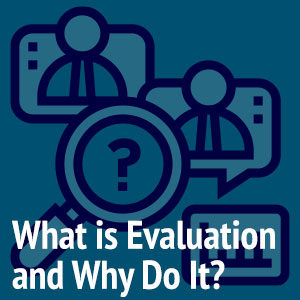 Before beginning an evaluation, it may be helpful to consider the following questions:
Before beginning an evaluation, it may be helpful to consider the following questions:
1. Why is the evaluation being conducted? What is/are the purpose(s) of the evaluation?
Common reasons for conducting an evaluation are to:
- monitor progress of program implementation and provide formative feedback to designers and program managers (i.e., a formative evaluation seeks to discover what is happening and why, for the purpose of program improvement and refinement.)
- measure final outcomes or effects produced by the program (i.e., a summative evaluation);
- provide evidence of a program’s achievements to current or future funders;
- convince skeptics or opponents of the value of the program;
- elucidate important lessons and contribute to public knowledge;
- tell a meaningful and important story;
- provide information on program efficiency;
- neutrally and impartially document the changes produced in clients or systems;
- fulfill contractual obligations;
- advocate for the expansion or reduction of a program with current and/or additional funders.
Evaluations may simultaneously serve many purposes. For the purpose of clarity and to ensure that evaluation findings meet the client’s and stakeholders’ needs, the client and evaluator may want to identify and rank the top two or three reasons for conducting the evaluation. Clarifying the purpose(s) of the evaluation early in the process will maximize the usefulness of the
evaluation.
2. What is the “it” that is being evaluated? (A program, initiative, organization, network, set of processes or relationships, services, activities?) There are many things that may be evaluated in any given program or intervention. It may be best to start with a few (2-4) key questions and concerns (See #4, below ). Also, for purposes of clarity, it may be useful to discuss what isn’t being evaluated.
3. What are the intended outcomes that the program or intervention intends to produce? What is the program meant to achieve? What changes or differences does the program hope to produce, and in whom? What will be different as the result of the program or intervention? Please note that changes can occur in individuals, organizations, communities, and other social environments. While evaluations often look for changes in persons, changes need not be restricted to alterations in individuals’ behavior, attitudes, or knowledge, but can extend to larger units of analysis, like changes in organizations, networks of organizations, and communities. For collective groups or institutions, changes may occur in: policies, positions, vision/mission, collective actions, communication, overall effectiveness, public perception, etc. For individuals: changes may occur in behaviors, attitudes, skills, ideas, competencies, etc. If you to learn more about out evaluation practice visit our Impact & Assessment reporting page.
Or click here to read our blog post “Approaching an Evaluation” and see 7 more important issues to consider.
See also:
Understanding Different Types of Program Evaluation



